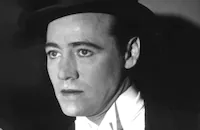The Man Who Came Back
Cast & Crew
Raoul Walsh
Janet Gaynor
Charles Farrell
Kenneth Mackenna
Mary Forbes
Ullrich Haupt
Film Details
Technical Specs

Synopsis
New York millionaire Thomas Randolph becomes furious when he learns that his spoiled, wastrel son Stephen has been involved in yet another highly publicized scandal. This incident, coupled with Stephen's reckless financial handlings, prompts Thomas to cut off his support and force him to work for a living. Stephen rejects his father's decision that he work at his San Francisco shipping company, and instead falls in love with Angie, a San Francisco cabaret singer who promises to follow him wherever he goes. When Stephen threatens to soil the Randolph name and never return if his father cuts him off, Thomas decides to teach his son a lesson by having him shanghaied and taken to China. Four months later, Stephen runs into Angie in a Chinese drug den, known in Shanghai as "Slackjaw Palace," where Angie pretends to be high on dope, unable to recognize him. Stephen tries to strangle Angie in order to get her to stop her drug habit, and they soon resume their romance. One year later, Stephen and Angie, living in Hawaii, are visited by Captain Trevelyan, a mutual acquaintance who appears to have developed a fondness for Angie. In the hope that Angie will leave Stephen when she learns that her sweetheart has returned to his alcoholic ways, Trevelyan tells her that he has seen Stephen on a drinking jag. While Angie feigns drug addiction to test Stephen's resolve to love her, Stephen's aunt arrives with news that his father is ill, forcing him to choose between staying by Angie's side, and going to his father's sickbed. After some deliberation, Stephen decides to stay with Angie. When Thomas decides that Stephen has learned his lesson, he summons him back to New York with a promise that he will take him into his firm, but only on the condition that he and Angie remain apart. Later, Thomas informs his son that he has had Angie watched while he was away, and tells him that she has left Honolulu with Captain Trevelyan. At that moment, Trevelyan and Angie enter and Thomas explains that he was satisfied with Angie's conduct under Trevelyan's surveillence, so he brought her over to be with Stephen.

Director

Raoul Walsh
Cast

Janet Gaynor

Charles Farrell
Kenneth Mackenna
Mary Forbes
Ullrich Haupt
William Worthington
Peter Gawthorne

Leslie Fenton

Eddie Kane
Olive Young
Crew
S. N. Behrman
Violet Bird
George S. Brooks
Archie Buchanan
Edwin Burke
Owen Davis
Arthur Edeson
George Leverett
Sonya Levien
Frank Merlin
Harold Schuster
W. R. Sheehan
Joseph Urban
Sophie Wachner

Film Details
Technical Specs

Quotes
Trivia
Humphrey Bogart was Charles Farrell (I)'s voice coach. He and several other actors had thought they were getting Farrell's part.
Notes
The novel on which the film is based was first published as a short story in American Mercury in November 1912. According to an April 1930 Film Daily news item, Humphrey Bogart was originally signed to a role in the film. The file for the film in the Twentieth Century-Fox Records of the Legal Department at the UCLA-Arts Special Collections Library indicates that Charles Gerrard was originally set for the part played by Eddie Kane. Although an ad in Film Daily in May 1930 noted that the film was to be "photographed throughout in color," the released film was black and white. The ad also listed Louise Huntington in the cast, but her appearance in the final film is doubtful. According to modern sources, director Frank Borzage, who was originally scheduled to direct this picture, was taken off the film after his previous picture, Liliom flopped. A Spanish-language version, Del infierno al cielo was also produced in 1931. The Man Who Came Back was also dubbed into German, Italian, French and Japanese. An earlier production based on the same source was the 1924 Fox film The Man Who Came Back, directed by Emmett Flynn and starring George O'Brien and Dorothy MacKaill.












